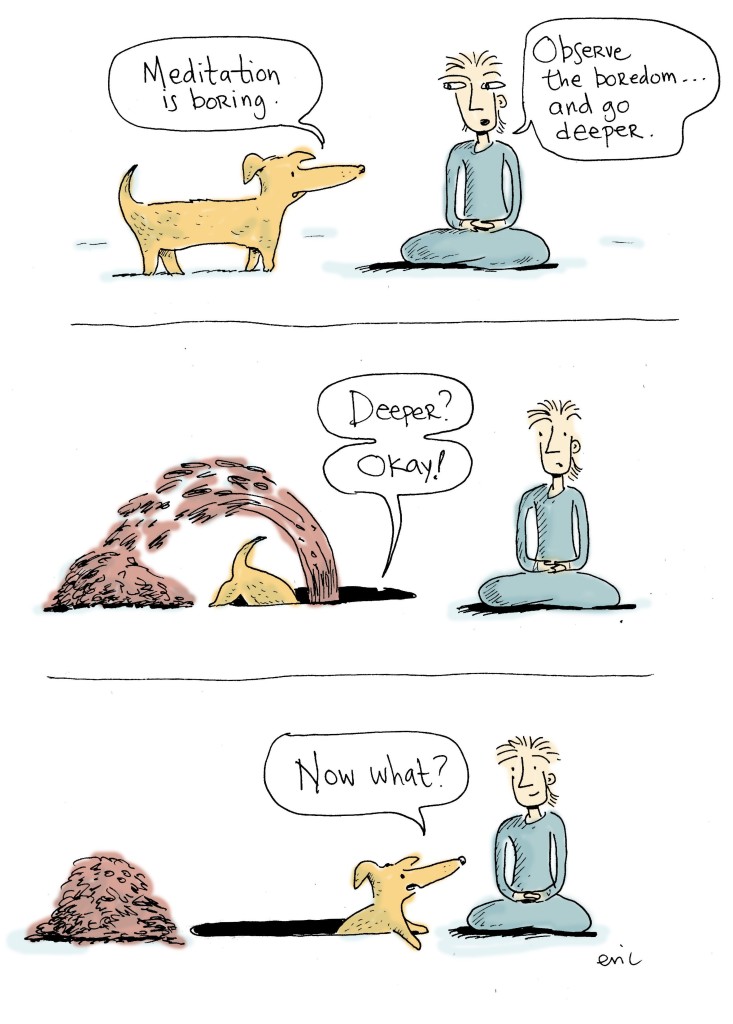As the pace of living accelerates, the mind—your mind—becomes bored more and more easily.
Not too long ago, it felt normal to wait a month to receive the next edition of your favorite magazine or comic book. Now, if what you want to read doesn’t download seconds after you click…the irritation starts to build.
Even a few seconds of waiting, can feel excruciating.
How much more so sitting still on a meditation cushion—breathing in…breathing out…in…out…Seriously!??
What can you do with a bored mind? The conditioned response is to seek out entertainment and distraction. To “relieve” the boredom with a new input, entertainment, information, anything. Relief comes for a few moments, and then the boredom begins to creep in again.
The mind that needs new stimulation will soon be looking for new stimulation.
Relieving boredom through distraction fills your life with distraction. Your life becomes a series of distracting events. The time lapse between relief and boredom grows ever-shorter and the need for more distracting distractions intensifies.
The mind bounces along, like a skipping stone, on the surface of life. Bounce, bounce, bounce from one distraction to the next. And here’s the harsh paradox of this bouncing life: when you live on the surface of life, you’re going to be really bored.
Boredom is a symptom of surface living. Because the richness, the meaning, the fulfillment of life is in the depths.
So, how do you free yourself from surface living and the inevitable boredom that ensues?
By cultivating the meditative mind. The meditative mind will take you deep…but first it will bring you face‐to‐face with boredom, the irritation, the skipping stone bouncy‐ness of the surface life.
But, now, through the power of meditative awareness, there’s a difference. What is that difference?
You don’t react to the boredom. You observe it.
You don’t distract yourself from the irritation. You include it.
You don’t skip away to a better, more distracting distraction. You return, rest, and settle into the deepening reality of this moment.
You receive all these bouncing states of mind with awareness and embrace them in a field of meditative observation. What is meditative observation?
Meditative observation is being fully aware of moment to moment experience without identifying with that experience. If the experience that arises is boredom, you discover—through practice—how to meditatively observe it. You learn how to be fully aware of the boredom, without becoming identified with the boredom.
Without identification, you can experience boredom as it is. Through the power of meditative awareness, you can allow boredom to be itself, fully and completely:
- You don’t become bored.
- You don’t react to the boredom.
- You don’t push it away or run from it.
Rather you witness, observe, and experience boredom completely.
When you experience boredom completely, it’s not boring. It’s not entertaining either. It is just what it is—an expression of life energy that arises, pulses through the nervous system, and changes into another expression of life energy. It comes. It goes.
It has its flavor, texture, tempo…a rich weave of qualities that you can witness, experience, and—as practice deepens—appreciate without attachment.
You don’t have to manipulate life. You don’t have to manipulate the boredom. You don’t have to change it or transform it. In the light of meditative awareness, the boredom transforms by itself. Why? Because that’s what life does. It constantly changes, transforms, and arises in ever‐new patterns. You don’t have to manipulate or control life (not that you really can, anyway).
This insight frees you from the impulse to escape boredom. It frees you from seeking entertainment. This revelation transforms the monotony of meditation into an ever‐new process of life revealing itself breath-by-breath. As your capacity to fully experience the pulsation of life energy deepens, the desire for distraction and entertainment dissolves into stillness.
The mind acclimates to stillness. You settle into stillness and discover that—stilling of the mind doesn’t mean the end of thought. Rather, it means the end of identification with thought. Including, but definitely not limited to, the thought, “I’m bored.”
So, when the mind asks, “What’s next?” Be still. Observe and experience the question fully, then go deeper.
Open and receive the unpredictable answer that is the present moment. Woof.
Relephant:
7 Easy Steps to Turn Boring Meditation into a Fun Habit.
Author: Eric Klein
Editor: Renée Picard
Image: original illustration by Eric Klein
Facebook is in talks with major corporate media about pulling their content into FB, leaving other sites to wither or pay up if we want to connect with you, our readers. Want to stay connected before the curtain drops? Sign up for our curated, quality newsletters below.












Read 1 comment and reply